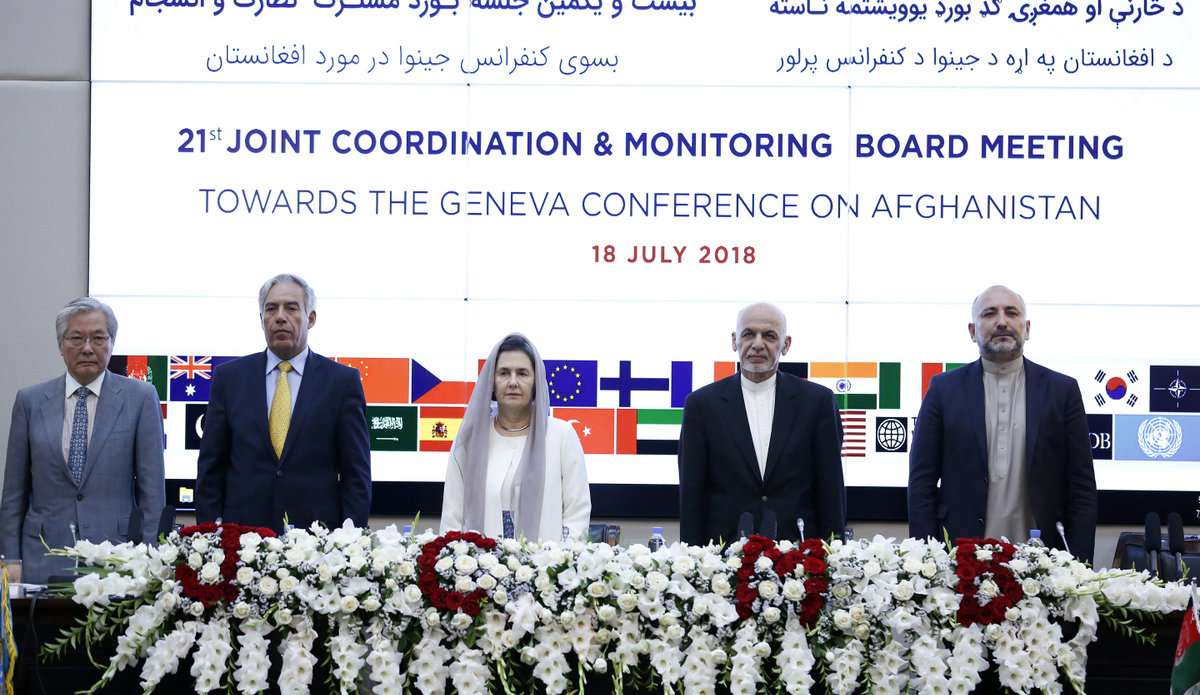Government, international community review progress ahead of Geneva Ministerial Conference
KABUL - The international community and the National Unity Government held the 21st Joint Coordination Monitoring Board Meeting (JCMB) at the Presidential Palace on 18 July to discuss progress, challenges and the way forward in implementing the government’s reform agenda, and on the concrete work to be addressed in the run up to the Geneva Ministerial Conference on Afghanistan, including the holding of inclusive and credible elections, moving forward on National Priority Programs, and implementing reforms.
The meeting was co-chaired by Acting Finance Minister and Chief Advisor to the President, Mohammad Humayon Qayoumi, and the UN Secretary-General’s Special Representative for Afghanistan, Tadamichi Yamamoto.
Afghanistan President Ashraf Ghani delivered the key note address and Chief Executive Abdullah Abdullah made closing remarks.
President Ghani focused on the peace process, and next steps for building on the national, regional and international consensus for peace. President Ghani recognized the immense sacrifices of the Afghanistan National Defence and Security Forces (ANDSF) and Afghan people, and thanked the international community and the United States in particular for their support in the journey to peace. To achieve peace, the President said, “We are all united on a common vision, committed to a productive dialogue where direct discussion, clear analysis and agreement on action provides the basis on building mutual trust.” President Ghani also committed to delivering six tasks before Geneva, including holding parliamentary elections in time and in a transparent manner.
Opening the conference, Acting-Minister Qayoumi focused on the achievements on the reforms agenda of the National Unity Government committed to at the London (2014) and Brussels (2016) conferences: “There is a thread of connectivity throughout the reforms agenda, as articulated in the Afghanistan National Peace and Development Framework (ANPDF) and National Priority Programs (NPPs). What is more important than sectoral achievements is, indeed, the collective impact of the progress made in the reform agenda across government. Indeed, what we are doing is nothing short of changing the way we govern, and in turn, changing what Afghans expect from their government."
Representing the international community, Tadamichi Yamamoto, co-chair of the JCMB, said, “Afghanistan faces special security, political, economic and social circumstances, including new opportunities for peace; elections; economic growth; invigorated efforts to combat corruption; and yet, increased poverty and continued insecurity. We considered these issues, to gauge the progress made and challenges ahead, and to chart a course toward the Geneva Conference on Afghanistan, to take place on 28 November at a critical juncture, taking place soon after the scheduled parliamentary elections and five months before the expected presidential elections, providing us a unique opportunity to review and assess our progress, accept challenges, and plan for the rest of the Transformation Decade.”
Chief Executive Abdullah gave closing remarks, reinforcing the importance of national unity and timely elections, and thanking the international community and ANDSF. “There have been gaps and inconsistencies in our efforts, but it has not been a waste. Lives have been changed,” he said. "We see impact in the areas of access to education, health and the democratic process.”
The conference was preceded by a working dinner focused on elections. In the meeting, co-chaired by Qayoumi and Yamamoto, the Afghan government provided updates on elections preparation and reinforced its commitment to making sure elections take place on time.
The JCMB focused on seven priority reform areas: security sector reforms, aid effectiveness, macro-economic reforms, private sector development, regional partners’ engagement, anti-corruption and justice, and implementation of NPPs. Seven moderated panels featured government officials, international partners, as well as members of civil society and the private sector in discussions on progress and challenges in each sector.
The JCMB is a series of high-level meetings that take place annually. It is a platform for the Afghan government and international partners to discuss issues of mutual importance and provide each other with updates on the progress, challenges and further developments on their reform commitments as Afghanistan works toward self-reliance.
Entitled “Towards the Geneva Conference on Afghanistan,” the 21st JCMB was an opportunity to discuss developments following the Senior Officials Meeting of the Government and international community and determine the way forward leading to the Geneva Conference on Afghanistan.
 UN
UN







